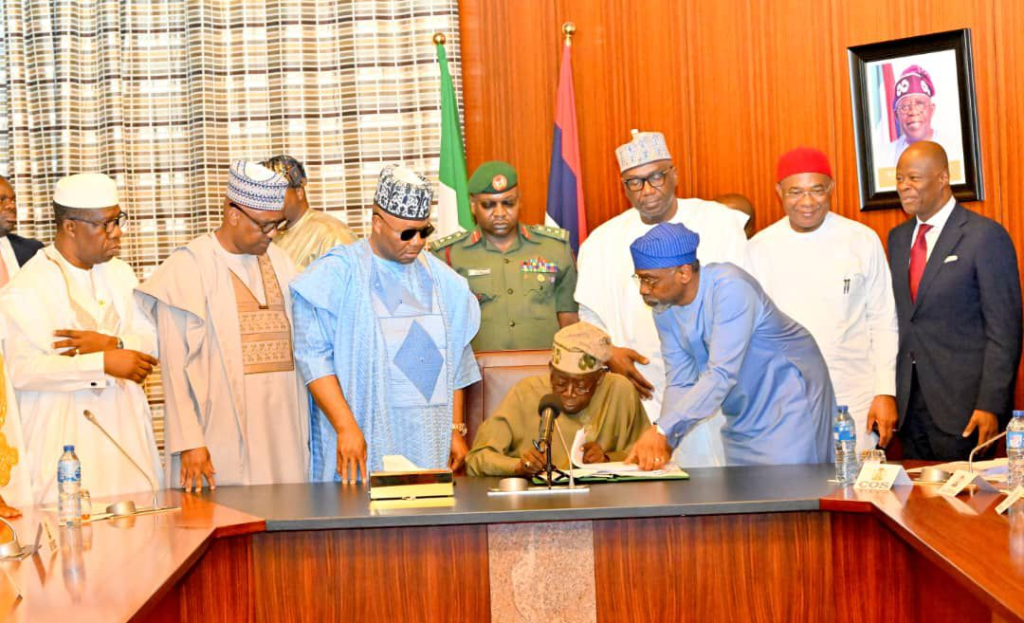The stated aims of Nigeria’s new tax laws are to simplify a multi-layered tax structure, boost compliance and generate sustainable revenue for national development.
The underlying issue with taxes in Nigeria, however, is more philosophical than technical. Nigeria needs a new social contract that can lead to increased public participation in governance. The question is: can this new tax regime lead to such a new contract?

What’s More to Reform?
Nigeria is a country persistently under reform. Every new government is ‘reforming’ a failed system, which is ironic considering that if previous reforms were successful, there wouldn’t be anything to reform.
The fuel subsidy removal was heralded by Tinubu’s administration as the solution to all of Nigeria’s economic woes. Nearly two years later, all the old problems are still with us and have only gotten worse. The fuel subsidy removal was supposed to free up resources for infrastructure and social programs. But ordinary Nigerians have seen little evidence of these benefits. Instead of the promised economic renaissance, we have only seen crushing economic hardship. The anticipated investment boom has not materialized.
And, yes, Nigeria still pays subsidy on fuel imports.
Well, on Thursday, June 26, 2025, the reformer-extraordinaire, President Tinubu signed four tax bills into law. The goal of the new laws was to reform Nigeria’s tax system—again! Apparently, after decades of tax reforms under every previous administration, Nigeria’s tax system still needs reforming.
In 2004, for instance, President Obasanjo undertook his own sweeping tax reforms. He established the Federal Inland Revenue Service (FIRS), enacted several tax laws, introduced VAT, etc. Yet, the tax-to-GDP rate remained below 10%. And in 2019, President Buhari introduced the Finance Act, with the same goal. The most common Nigerians saw of it was an explosion in bank charges. Yet again, the tax-to-GDP rate remained below 10.6% in 2023, or just 6.7% of GDP in 2021 and 6.3% in 2022.
The pattern is so predictable it’s almost comical: diagnose the same problems, propose the same solutions with different names, hold signing ceremonies with grand proclamations, then watch as the fundamental issues remain unchanged.
I am pleased to announce that this morning I signed into Law the Finance Bill, 2019.
— Muhammadu Buhari (@MBuhari) January 13, 2020
We introduced the Bill alongside the 2020 Budget, to:
— Muhammadu Buhari (@MBuhari) January 13, 2020
-Reform Nigeria’s tax laws to align with global best practices;
-Support MSMEs in line with our Ease of Doing Business Reforms;
-Incentivize investments in infrastructure and capital markets;
-Raise Government revenues.
Nigeria’s Reform Paradox
This creates what we might call the “Reform Paradox” or a country that is in a state of perpetually being fixed but never actually works. Each new administration inherits the ‘reformed’ systems of their predecessors, only to declare them broken and in need of further reform. It’s like a mechanic who keeps pretending to fix the same car that never actually runs properly, charging you for each repair while avoiding the fundamental engine problems. Or like the doctor who only treats the symptoms without touching the virus, so you can returning for visits and parting with money.
Tinubu’s tax reforms follow this familiar script. The new tax laws promise to simplify the system, boost compliance and generate sustainable revenue – the exact same promises made by every previous tax reform effort.
But the truth is that technical reforms can’t solve governance problems. You can’t streamline your way out of corruption, digitize your way out of incompetence, or legislate your way out of a fundamental crisis of legitimacy. The new tax laws might look impressive on paper, but they exist within the same dysfunctional political economy that has frustrated every previous reform attempt.
The real problem is Nigeria’s relationship with oil money.
Eliminating the Rentier State
For decades, Nigeria has operated as what economists call a “rentier state“, or a state whose government funds itself not through citizen taxes, but by extracting rent from natural resources. With over 70% of government revenue coming from oil, Nigerian politicians have been freed from the pressure to serve taxpayers. The consequences have been devastating: despite earning over $831 billion from oil reserves between 1999 and 2023, Nigeria’s roads, schools and hospitals remain among the world’s worst. And Nigeria’s reputation around the world remains that of an immensely corrupt and inefficient society.
A rentier state funds itself not through taxes or productivity, but by extracting “rent” from natural resources. In Nigeria’s case, as in the case of oil-wealthy countries like Qatar, UAE, Venezuela, Saudi Arabia, etc., it is the rents on oil that fund the state. According to The Guardian, low taxes and the erratic collection of them are common features of life in most oil-wealthy nations. In such states, the government is essentially a middleman who sells crude oil to global markets to fund its objectives, without requiring or seeking the participation of its citizens.
This oil dependency has created a fundamental disconnect between a ruling elite and the citizenry. The reason is that when people don’t fund their government through taxation, they don’t demand hold them accountable. Taking a philosophical view, Nigeria’s new tax laws can only be seen as an ambitious attempt to reverse this dynamic and create a government funded by the people. Otherwise, it will not achieve much if not anything.
The Vision, According to their Architect
The architect of Nigeria’s new tax laws, President Tinubu framed them in transformational terms at Thursday’s signing ceremony: “What we did a few minutes ago is the way forward for our country’s prosperity. Leadership must help people take off, lead the way, and navigate every turn and twist.”
The president emphasized that these changes represent more than technical adjustments: “We are in transit; we have changed the roads, we have changed some of the misgivings, we have opened the doors to a new economy, business opportunities. We have shown the world that Nigeria is ready and open for business.”
Acknowledging the political difficulty of the process, Tinubu noted: “It was initially difficult, but not all roads will be easy in nation-building. What you have provided is leadership and courage in the face of mounting disputes. Nowhere in the world would tax reforms be easy.”

Key Highlights of the Reform
The four new laws create a comprehensive overhaul of Nigeria’s tax system:
Immediate Relief for the Poor and Small Businesses:
- Citizens earning less than ₦250,000 monthly (₦3 million annually) are completely exempt from income tax
- Essential goods like food, healthcare, education, and electricity are now VAT-exempt
- Small businesses with annual turnover below ₦50 million no longer pay corporate income tax
- A rent relief of ₦200,000 is applied to low-income earners
Streamlined Tax Structure:
- The Nigeria Tax Act consolidates multiple overlapping taxes into a single code and eliminates over 50 small taxes
- The Federal Inland Revenue Service becomes the Nigeria Revenue Service with expanded mandate
- Corporate tax rates will drop from 30% to 27.5% in 2025 and 25% thereafter
- VAT remains at 7.5% with no increase
Enhanced Accountability Mechanisms:
- Creation of a Tax Ombudsman and Tax Appeal Tribunal
- Improved coordination between federal, state, and local tax authorities
- Digital infrastructure requirements for transparency
The Deeper Game Is to Build a Tax Culture
The numbers game is to boost non-oil taxes to 50% of revenue by 2030. But this isn’t, or cannot, just about numbers, it’s about fundamentally changing the relationship between citizen and state. The new tax laws can only work if they represent Nigeria’s most ambitious effort yet to redefine the relationship between the citizen and the state. What is at stake is not merely revenue generation, but the birth of a new civic compact where taxation becomes a cornerstone of public participation, state accountability and democratic legitimacy.
Nigeria’s tax-to-GDP ratio, hovering around 10–11%, far below the African average of 16–18% and pales in comparison to OECD nations like Denmark or Germany, where taxes fund over 40% of government activity. This disparity reflects a broader philosophical gap. In countries where citizens fund the state, they feel empowered to demand transparency, quality infrastructure and political responsiveness. In Nigeria, where oil rents rather than taxes have historically funded governance, the public has been rendered passive bystanders to decisions made in their name but not with their money.
The broader goal of Nigeria’s new tax laws is to disrupt this pattern. By exempting low-income earners and small businesses from income and corporate taxes and by eliminating VAT on essentials such as food, electricity and healthcare, the system introduces progressive fairness. At the same time, merging 50+ overlapping taxes into a streamlined code and creating a Tax Ombudsman and Appeal Tribunal signals a turn toward simplicity, justice and transparency. These are part of cultural overtures that can foster tax morale and trust.

The Effects Are to Be Seen
Implementation of these new tax laws begins on January 1, 2026. The goal of post-dating the implementation is to give the government six months to prepare adequate sensitization of all Nigerians. The real test will come not in the legislation’s technical provisions, but in whether it can achieve its deeper objective: transforming Nigeria from a nation of bystanders into a country of engaged citizens.
The success of these new tax laws will hinge on the credibility of the institutions that will enforce them. Without real improvements in public service delivery, reductions in corruption and demonstrable accountability, citizens may continue to see taxation as extortion rather than contribution. This places the greater responsibility on the government. If implemented with integrity, the reforms could redefine citizenship in Nigeria, not just as a legal status, but as an economic and moral partnership in the making of the state.
Ultimately, this reform can only succeed if taken as a philosophical pivot that can convert Nigeria from a rentier state into a participatory democracy, where paying tax is not a burden, but a badge of ownership and participation in the national project. The question isn’t whether the new laws technically sound: they might be.
The ultimate question, however, is whether they can finally break Nigeria’s relationship with oil money and create the new social contract the country desperately needs? Or are we witnessing another cycle of reform theatre, where the real problems remain untouched while our politicians claim credit for ‘reforms’?












